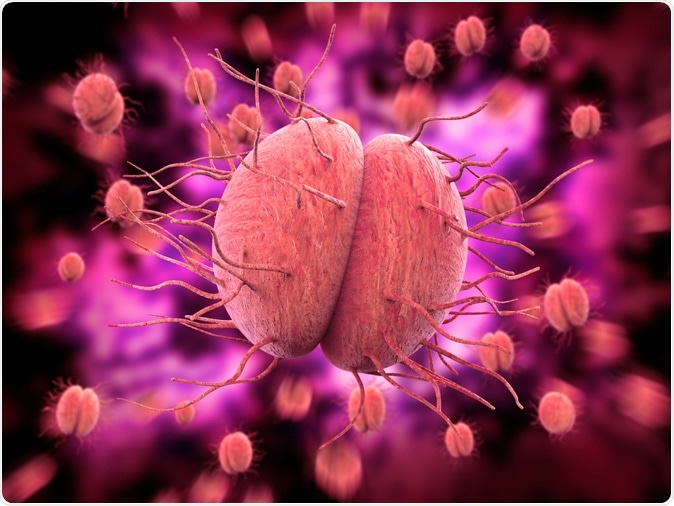A team of researchers may have found a way to block gonorrhea infection by blocking bacterial pathogen from using zinc, an essential mineral found in many food sources.
The researchers from Georgia State University found that blocking the ability of the pathogen that causes the sexually transmitted infection (STI) to uptake zinc mineral can stop the infection. The findings of the study, published in the journal PLOS Pathogens, could pave the way to hasten gonorrhea vaccine development.

Bacteria Neisseria gonorrhoeae - 3D illustration Credit: Giovanni Cancemi / Shutterstock
Gonorrhea drug-resistance
At present, gonorrhea is resistant to many treatment approaches, and there’s still no vaccine developed to prevent the serious infection. Across the globe, more than 1 million sexually transmitted infections (STIs) are acquired each day. In 2012, there were 27 million prevalent cases of gonorrhea.
In the United States, there are more than 820,000 new gonorrhea cases every year, and more than half are found in young people between the ages of 15 and 24 years old. The causative agent of gonorrhea, Neisseria gonorrhoeae, is an urgent threat to health since it has developed resistance to nearly all drugs used for treating it. It is now considered an STI that is very difficult to cure.
“Neisseria gonorrhoeae causes the sexually-transmitted infection gonorrhea, a global disease that is difficult to treat and for which there is no vaccine,” the researchers wrote in the study.
The Gonococcal Antimicrobial Resistance Surveillance Program reports high rates of quinolone resistance and increasing resistance for azithromycin and extended-spectrum cephalosporins. Drug resistance among gonorrhea cases is becoming a major threat among patients worldwide.
Zinc important for gonorrhea bacteria survival
Neisseria gonorrhoeae infection is hard to treat it contains potent membrane proteins that allow the bacterium to survive nutritional immunity, a strategy of the host body to ward off essential vitamins and minerals from the invading bacteria, thereby, handicapping their infectious power.
In fact, it has eight outer membrane transporters, where four are intended for the uptake of iron, while two of the transporters, TdfH and TdfJ, are used for zinc uptake. The researchers had a previous work where they showed how TdfH combines with Calprotectin, belonging to the S100 protein family. Then, it extracts zinc, which is internalized or absorbed by the bacteria.
Hence, the study wants to know if other proteins belonging to the S100 family can support the bacteria’s growth through zinc uptake. They found that TdfJ binds to S100A7 and that TdfJ and TdfH take zinc from the human protein gene S100A7 after binding to it. Zinc mineral powers the bacteria, helping in survival.
The new study opens the doors for the development of a new vaccine that could starve and kill the bacteria, which can protect the host from the invading pathogen.
The National Institutes of Health’s National Institute of Allergy and Infectious Diseases granted the funding of the study, with $9.25 million budget. The group plans to develop a vaccine that blocks the uptake of both iron and zinc, to fully protect the body against the serious infection.
What is gonorrhea?
Gonorrhea is a sexually transmitted infection (STIs) that can infect both men and women. Neisseria gonorrhoeae can infect mucous membranes of the reproductive tract, such as the fallopian tubes, uterus, and cervix. It can also affect the urethra in men and women. Aside from that, it can affect the mucous membranes of the throat, mouth, rectum, and eyes.
The infection affects the patient’s genitals, rectum, and throat. Though the infection is very common, it is very hard to treat.
People can get gonorrhea by having vaginal, oral, or anal sex with someone infected. Also, pregnant women can transfer the infection to their babies during delivery.
The common signs and symptoms of gonorrhea in men include testicular, scrotal pain, and urethral infection. Mostly, men are asymptomatic but can develop dysuria or painful urinating about one to 14 days after the initial infection. Men may also a whitish, yellowish, or greenish discharge.
In women, the early signs and symptoms include difficulty or painful urination, vaginal bleeding between periods, and increased vaginal discharge. In people who develop a rectal infection, they may experience itching, soreness, discharge, and painful bowel movements.
Journal reference:
The Novel Interaction Between Neisseria gonorrhoeae TdfJ and Human S100A7 Allows Gonococci to Subvert Host Zinc Restriction, Maurakis S, Keller K, Maxwell CN, Pereira K, Chazin WJ, et al. (2019) The Novel Interaction Between Neisseria gonorrhoeae TdfJ and Human S100A7 Allows Gonococci to Subvert Host Zinc Restriction. PLOS Pathogens 15(8): e1007937. https://doi.org/10.1371/journal.ppat.1007937